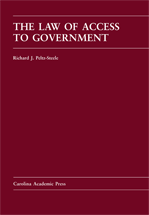A new open government casebook has been published. The Law of Access to Government (Carolina Academic Press 2012) is written by Richard J. Peltz-Steele, law school professor at the University of Massachusetts Dartmouth.
This is the only casebook geared entirely to the study of access to government, or freedom of information law. The book employs the law-school case method, but is suitable as well for graduate and advanced undergraduate students in journalism and mass communication. Cases aim to stimulate student interest, treating, for example, access to sexual-offense allegations against pro athletes, in addition to doctrinal essentials, such as Press-Enterprise and RCFP. Extensive notes raise legal and policy questions. The book includes graphic elements and a statutory appendix and is updated with developments in the war on terror, including embedding, war photos, and state secrets. The forthcoming Teacher's Manual will provide course guidance, content summaries, and references to audiovisual materials.
The Law of Access to Government
 |
by Richard J. Peltz-Steele Professor, School of Law, University of Massachusetts Dartmouth August 31, 2012 2012 • $70.00 • 540 pp • casebound • ISBN: 978-1-59460-876-6 • LCCN 2010934325 Preview The Law of Access to Government on Carolina Academic Press Front Matter Available for Download on SSRN |
Preface from the author
There’s no sugar-coating it. Access law is hard.
practitioner of the law of “access”—what’s usually referred to as the “freedom of information”—epitomizes the lawyer as generalist. FOI spans the legal sub-disciplines from the fundamental structure of government to the minutiae of administrative procedure, sweeping across topics as far-ranging as terrorism and criminal investigations, family relations and personal privacy, economic development and intellectual property, and information management and technology. The complexity of FOI, coupled with a dearth of financial incentives, discourages many lawyers from becoming involved with it.
Yet FOI is not a lawyer’s tool; it’s for everyone. The state university alum who asks the registrar for a transcript, the homebuyer who checks the zoning map online, and the curious parent who attends a school board meeting are all using FOI. Whether the mechanism of access is common law, administrative rule, sunshine statute, or constitutional doctrine, FOI in its broadest formulation is simply transparency. Transparency is a sine qua non of democracy, hand in hand with free speech and fair elections.
There is an irony, then, that the law of transparency is so opaque. Much of the time, it functions in the background without notice. But when it fails to function—when access requester and government official don’t see eye to eye, or when the rights of third persons are implicated by disclosure—then parties and advocates, as well as their judges and arbiters, often find themselves ill equipped to tackle the problem with a full understanding of the relevant history, law, and policy. FOI is rarely recognized in journalism, law, or public policy school as comprising a coherent stratum of doctrine.
Thus this book. The materials presented here are compiled and prepared with the law school case method in mind. But the aim is to give shape to FOI as a body of law accessible to the journalism, law, or public policy graduate student. The aim is to foment a vital and informed practice of FOI law and policy in public life, whatever the perspective or profession of the practitioner, and thereby to exalt healthy transparency in furtherance of democracy and public accountability.
Access law is hard. But big rewards require big investments. So sharpen your pencil, focus your mind, and turn the page to The Law of Access to Government.
Richard J. Peltz-Steele
North Dartmouth, Massachusetts
16 June 2012

